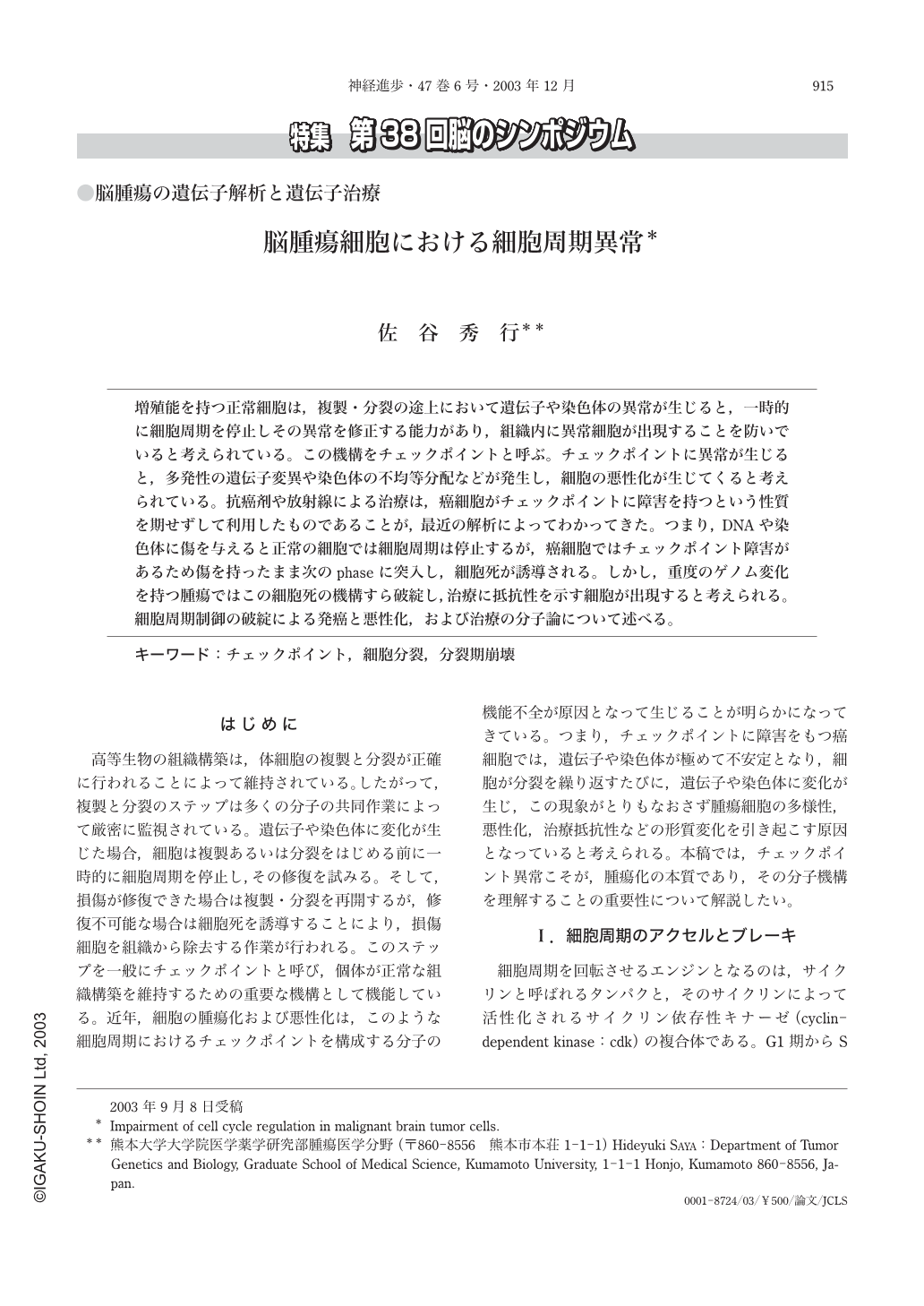Japanese
English
- 有料閲覧
- Abstract 文献概要
- 1ページ目 Look Inside
増殖能を持つ正常細胞は,複製・分裂の途上において遺伝子や染色体の異常が生じると,一時的に細胞周期を停止しその異常を修正する能力があり,組織内に異常細胞が出現することを防いでいると考えられている。この機構をチェックポイントと呼ぶ。チェックポイントに異常が生じると,多発性の遺伝子変異や染色体の不均等分配などが発生し,細胞の悪性化が生じてくると考えられている。抗癌剤や放射線による治療は,癌細胞がチェックポイントに障害を持つという性質を期せずして利用したものであることが,最近の解析によってわかってきた。つまり,DNAや染色体に傷を与えると正常の細胞では細胞周期は停止するが,癌細胞ではチェックポイント障害があるため傷を持ったまま次のphaseに突入し,細胞死が誘導される。しかし,重度のゲノム変化を持つ腫瘍ではこの細胞死の機構すら破綻し,治療に抵抗性を示す細胞が出現すると考えられる。細胞周期制御の破綻による発癌と悪性化,および治療の分子論について述べる。
はじめに
高等生物の組織構築は,体細胞の複製と分裂が正確に行われることによって維持されている。したがって,複製と分裂のステップは多くの分子の共同作業によって厳密に監視されている。遺伝子や染色体に変化が生じた場合,細胞は複製あるいは分裂をはじめる前に一時的に細胞周期を停止し,その修復を試みる。そして,損傷が修復できた場合は複製・分裂を再開するが,修復不可能な場合は細胞死を誘導することにより,損傷細胞を組織から除去する作業が行われる。このステップを一般にチェックポイントと呼び,個体が正常な組織構築を維持するための重要な機構として機能している。近年,細胞の腫瘍化および悪性化は,このような細胞周期におけるチェックポイントを構成する分子の機能不全が原因となって生じることが明らかになってきている。つまり,チェックポイントに障害をもつ癌細胞では,遺伝子や染色体が極めて不安定となり,細胞が分裂を繰り返すたびに,遺伝子や染色体に変化が生じ,この現象がとりもなおさず腫瘍細胞の多様性,悪性化,治療抵抗性などの形質変化を引き起こす原因となっていると考えられる。本稿では,チェックポイント異常こそが,腫瘍化の本質であり,その分子機構を理解することの重要性について解説したい。
Cell cycle is the universal process by which cells reproduce. The most important events of the cell cycle are those concerned with the copying and partitioning of the hereditary material, that is replicating the chromosomal DNA during S phase and separating the replicated chromosomes during M phase. Controls operate that regulate onset of these events and compensate for errors in their execution. The precision with which cell cycle events are executed ensures the survival of living organisms, while loss of this precision increases genomic instability.
Maintenance of genomic integrity after DNA damage depends on the coordinated action of the DNA repair and checkpoint systems during cell cycle. Checkpoints control a signaling system that changes in the activity of cyclin-dependent kinases(cdks), resulting in delay cell cycle progression. Arrest in G1 is considered to prevent aberrant replication of damaged DNA and arrest in G2 allows cells to avoid segregation of defective chromosomes. The failure in checkpoint control leads to genomic instability, which causes multiple DNA sequence alterations and chromosomal aberrations, and disposition to cancer.
Most cancer therapies target cell cycle checkpoints by activating checkpoint-mediated cell death or by enhancing chemical sensitivity due to loss of checkpoint function. By treatment with genotoxic agents, cancer cells, which generally have impairment of checkpoint functions, initially arrest in the G2 phase of the cell cycle but are unable to maintain cell-cycle arrest. Those cells eventually die as they entered mitosis. This process is called'mitotic catastrophe'. This review discusses the critical relationship between mitotic checkpoint function and sensitivity of cancer cells to anti-tumor therapies.

Copyright © 2003, Igaku-Shoin Ltd. All rights reserved.


